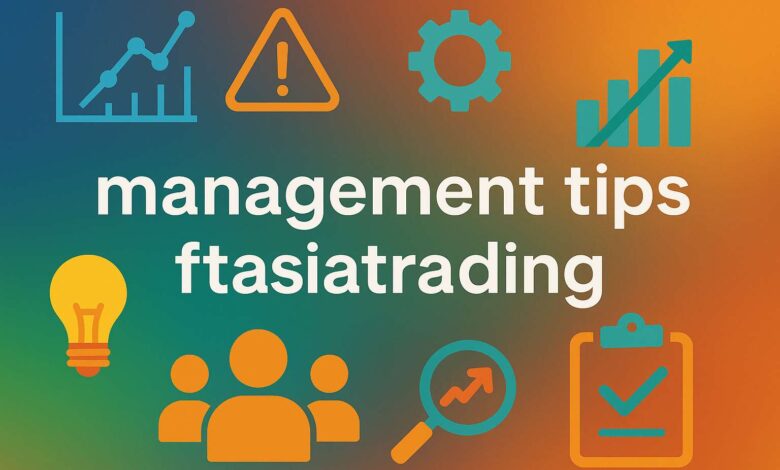Management Tips ftasiatrading: Powerful Strategies for Global Trading Success
Unlocking Positive Growth While Avoiding Negative Pitfalls in Modern Trading

Introduction
In today’s fast-paced trading world, companies need more than just capital to thrive—they require strong leadership, effective strategies, and a deep understanding of both opportunities and risks. Management tips ftasiatrading highlight essential practices for businesses seeking stability, profitability, and sustainable expansion.
Every trading enterprise faces two realities: the potential for positive growth and the risk of negative setbacks. To overcome challenges like compliance, data accuracy, or operational inefficiency, managers must embrace modern tools, adapt continuously, and ensure that customer trust is never compromised.
Quick Bio
| Attribute | Details |
|---|---|
| Focus | Management tips for trading businesses |
| Core Strength | Blending digital tools, compliance, and strategic planning |
| Benefits | Increased efficiency, reduced risk, stronger client trust |
| Challenges | Market volatility, regulatory demands, organizational resistance |
| Goal | Achieving global trading success through innovation and resilience |
The Power of Strategic Planning
Strategic planning forms the backbone of every successful trading business. It defines long-term objectives, creates a clear roadmap, and ensures alignment across departments. Leaders who prioritize strategic planning are better equipped to forecast market changes and identify opportunities for expansion.
Without structured planning, businesses face disorganized growth, missed opportunities, and increased operational costs. By contrast, companies that invest in clear direction enjoy brand trust in trading and long-term stability.
Building Strong Organizational Structure
Clarity in Roles and Responsibilities
A trading business needs a robust organizational structure where every role is well-defined. When leaders and teams understand their responsibilities, tasks are executed efficiently, and accountability becomes part of the culture.
This structure fosters cross-functional teams where communication flows smoothly. Instead of departments working in silos, collaboration ensures trading operations efficiency and helps resolve issues faster.
Embracing Digital Tools and Automation
Harnessing Technology for Efficiency
The modern market demands speed and precision. Digital tools for management such as ERP software, dashboards, and CRM systems allow managers to monitor performance in real time. With real time data, companies can make timely adjustments to improve processes.
Automation further enhances productivity. By automating repetitive tasks like invoicing or notifications, managers free up human talent for innovation and decision-making. This balance ensures that technology supports, rather than replaces, human expertise.
Effective Communication and Team Development
Building Internal Strength
Strong internal communication is critical in ensuring that teams work toward shared goals. Daily check-ins, project management tools, and regular feedback help employees stay aligned.
Equally important is team development. Continuous learning opportunities and mentorship programs prepare employees to adapt to new technologies, compliance requirements, and market changes. A culture of continuous learning also boosts morale and productivity.
Risk Management and Compliance
Balancing Opportunity with Responsibility
No trading enterprise can ignore risks. An effective risk management strategy involves identifying threats such as market volatility, regulatory shifts, and financial instability. Companies must prepare for worst-case scenarios while seizing profitable opportunities.
In addition, compliance and regulations play a vital role. Cross-border trading requires strict attention to laws, taxes, and licensing. Failure to comply not only damages reputation but also risks heavy financial penalties. Proactive compliance strengthens customer trust in trading and builds credibility.
Financial Management and Tracking Expenses
Building a Resilient Business Model
Sound financial management is more than balancing books—it’s about ensuring long-term survival. Businesses should monitor tracking expenses, manage cash flow, and diversify income streams. This creates a buffer against sudden market shocks.
Key practices include establishing a financial management strategy and reviewing key performance indicators. Data-driven oversight enables smarter decisions, better budgeting, and sustainable profitability.
Data-Driven Decision Making
Using Metrics for Smarter Choices
Modern businesses succeed by applying data-driven decision making to every aspect of management. By monitoring performance analytics and KPIs, leaders gain insight into strengths and weaknesses.
For instance, analyzing supply chain timelines helps improve supply chain management, while measuring customer acquisition costs guides smarter marketing investments. This process ensures every decision is based on measurable outcomes, not assumptions.
Innovation and Scaling with Technology
Driving Long-Term Growth
Innovation remains central to trading excellence. Whether adopting new trading platform features or exploring advanced analytics, businesses that innovate are more competitive. Innovation in trading management also keeps teams motivated and clients engaged.
At the same time, scaling with technology enables expansion without overwhelming resources. Automated workflows, AI-driven insights, and streamlined logistics systems all reduce inefficiency while supporting rapid growth.
Transparency and Customer Trust
The Heart of Global Success
Trust is the foundation of global trading success. Companies must prioritize transparency in business, ensuring customers are informed about pricing, delivery, and service quality.
This openness builds long-term relationships. Clients who trust your company are more likely to return, recommend services, and remain loyal even during market turbulence. Maintaining brand trust in trading is a priceless asset that drives competitive advantage.
Conclusion
The journey toward success in trading is both promising and challenging. By applying management tips ftasiatrading, businesses can combine strategic planning, compliance, innovation, and strong communication to reach new heights.
Positive outcomes include growth, efficiency, and global reach. However, ignoring essential practices such as compliance, risk management, or financial discipline may lead to negative consequences like legal issues, financial loss, or damaged reputation.
The future belongs to businesses that stay adaptive, customer-focused, and data-driven. With resilience and foresight, trading enterprises can secure a powerful place in the global market.
Frequently Asked Questions (FAQ)
Q1. Why are management tips important for trading businesses?
They provide a framework for efficiency, compliance, and profitability while helping companies adapt to market changes.
Q2. How can digital tools improve trading management?
They allow real-time data tracking, automate repetitive tasks, and reduce human error, boosting overall efficiency.
Q3. What role does compliance play in global trading?
Compliance ensures businesses follow laws and regulations, protecting them from penalties and building client trust.
Q4. Why should trading companies track expenses closely?
Tracking expenses helps identify unnecessary costs, improves budgeting, and ensures financial stability during volatile times.
Q5. How can businesses build customer trust in trading?
Through transparency, timely communication, fair dispute resolution, and consistent delivery of promises.




